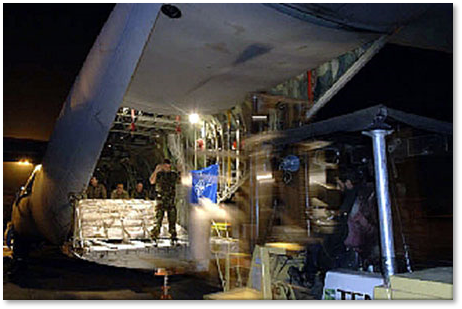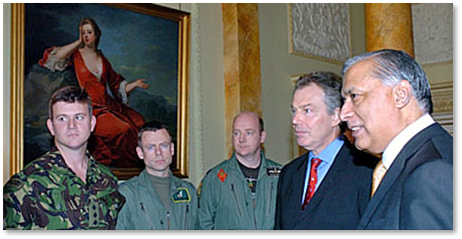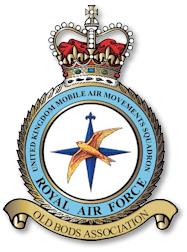



With 860 tonnes of Aid to move, comprising of 104,000 blankets, 10,000 tents and 2,400 stoves, the Royal Air Force is providing a vital airlift capability to the earthquake relief effort in Pakistan, as part of the NATO Response Force (NRF).
A Royal Air Force C130-J Hercules from RAF Lyneham was the first aircraft to arrive in Islamabad with the initial 9 tonnes of these vital supplies.
A small contingent of Royal Air Force personnel, including the C-130-J Hercules aircrew of 24 & 30 Squadron based at RAF Lyneham, accompanied by members of the RAF's UK Mobile Air Movements Squadron, Royal Air Force Engineers, Police and the Tactical Air-Land Coordination Element (TALCE) - all also based at Lyneham, left the base on Tuesday 18 October 05, to begin the journey nearly half-way round the globe to begin conducting the air lifts.
A small contingent of Royal Air Force personnel, including the C-130-J Hercules aircrew of 24 & 30 Squadron based at RAF Lyneham, accompanied by members of the RAF's UK Mobile Air Movements Squadron, Royal Air Force Engineers, Police and the Tactical Air-Land Coordination Element (TALCE) - all also based at Lyneham, left the base on Tuesday 18 October 05, to begin the journey nearly half-way round the globe to begin conducting the air lifts.
In the light of worsening weather conditions and an increasing need for further support to the earthquake hit region of Pakistani-controlled Kashmir, the United Nations High Commission for Refugees (UNHCR) requested support from the NATO alliance, including one of it's most recent members, Turkey . This alliance meant the UNHCR could use the Turkish Air Force Base at Incirlik as a co-ordination point for the Aid which was brought in by road from UNHCR warehouses in Iskander. The NRF was then able to use the Air Base as a forward operating base for the onward journey to Pakistan .
The Royal Air Force flight was the first to arrive at the Chaklala Military airport in Islamabad and was greeted by Brigadier General Antonius Strik, Chief of the NATO Operational Liaison Team. With no time to waste, the pallets were off-loaded immediately, freeing the aircraft to return to Turkey to collect more aid. Further NRF aid flights are due to begin arriving in Pakistan over the next few days, including those provided by France , Greece and Italy.
The UNHCR spokesman and coordinator at Incirlik, said, "This air lift is a vital link in the chain for us. The co-ordination of moving the aid resources is a huge and complex task. Having the assistance of the Royal Air Force and their NRF colleagues to move the supplies into Pakistan makes our job possible."
The UNHCR spokesman and coordinator at Incirlik, said, "This air lift is a vital link in the chain for us. The co-ordination of moving the aid resources is a huge and complex task. Having the assistance of the Royal Air Force and their NRF colleagues to move the supplies into Pakistan makes our job possible."
UKMAMS involvement is best described in the following report on Operation Maturin: Following the catastrophic and extensive earthquake in Pakistan early in October 2005, the country was faced with an enormous humanitarian crisis with thousands of people killed and millions displaced or cut-off. The remote location of most of the population meant that aid distribution was particularly difficult, while the onset of winter presented a further threat to those left without shelter or food. The Squadron was tasked on 15 October 2005 to assist with the Operation and deployed within 3 days, flying a team to Incirlik in Turkey.
The 8 man team built up a local appreciation of the situation and flew with aircraft between Turkey and Islamabad in Pakistan. A further 3 personnel were deployed the following day while 13 more were placed on R1 standby, eventually deploying to Adana in Turkey to co-ordinate the loading of 900 tonnes of relief supplies.
The 8 man team built up a local appreciation of the situation and flew with aircraft between Turkey and Islamabad in Pakistan. A further 3 personnel were deployed the following day while 13 more were placed on R1 standby, eventually deploying to Adana in Turkey to co-ordinate the loading of 900 tonnes of relief supplies.
On 22 Oct a 4 man team deployed by C17 to Islamabad with the first of 3 Chinook helicopters that would deliver aid to remote villages. These personnel stayed in Islamabad to receive further C17 flights, while also assisting with the daily C130s and over 300 pallets worth of freight.
Pakistan Prime Minister meets earthquake-relief troops at Downing Street

6 March, 2006 - Pakistan Prime Minister Shaukat Aziz was at Downing Street this morning to thank UK troops involved in the humanitarian relief effort following the devastating earthquake in Pakistan last year. Major Nigel Cribb, Commanding Officer of 59 Independent Commando Engineers Squadron, was accompanied by Captain Jim Lewis Royal Marines and Lance Corporal Guy Parkin.
They were personally thanked by Prime Minister Aziz and Prime Minister Tony Blair who then chatted with the team, including RAF pilots Squadron Leader Mark Abrahams and Flight Lieutenant Dave Fryar, about the operation.
They were personally thanked by Prime Minister Aziz and Prime Minister Tony Blair who then chatted with the team, including RAF pilots Squadron Leader Mark Abrahams and Flight Lieutenant Dave Fryar, about the operation.
Secretary Of State John Reid said, "The relief operation confirmed once again the ability of British forces to step up to the mark and do a fantastic job in the harshest of environments. I am tremendously proud of the work of our Armed Forces and delighted that Prime Ministers Blair and Aziz could formally recognise their contribution today."
Corporal Parkin said, "We worked hard at the time and it was fantastic to go to Downing Street and get a personal thank you from two Prime Ministers."
Group Captain Sean Reynolds, Station Commander at Royal Air Force Odiham added, "This was a stunning performance and I am immensely proud of the team from RAF Odiham and what they have achieved."
Corporal Parkin said, "We worked hard at the time and it was fantastic to go to Downing Street and get a personal thank you from two Prime Ministers."
Group Captain Sean Reynolds, Station Commander at Royal Air Force Odiham added, "This was a stunning performance and I am immensely proud of the team from RAF Odiham and what they have achieved."
Group Captain Sean Reynolds, Station Commander at Royal Air Force Odiham added, "This was a stunning performance and I am immensely proud of the team from RAF Odiham and what they have achieved."
The Commando Engineers deployed to Bagh in November 2005 at very short notice. Against the huge challenges of the rocky terrain, extreme weather and the chaos caused by the earthquake, the elite lived up to their high reputation and completed, among many others, the following tasks:
The Commando Engineers deployed to Bagh in November 2005 at very short notice. Against the huge challenges of the rocky terrain, extreme weather and the chaos caused by the earthquake, the elite lived up to their high reputation and completed, among many others, the following tasks:
O
Building 30 large school shelters, including one to replace a girls’ school destroyed by the quake in the village of Mukhdoom Kot at 6000 feet
O
Building 17 health centres, including one for the World Health Organisation
O
Putting out a house fire
O
Rescuing an 11-vehicle aid convoy trapped in deep snow
O
Distributing food and clothing to remote areas
The team comprised seventy six members of 59 Independent Commando Squadron Royal Engineers and ten members of 42 Commando Royal Marines - all specialists in mountain and cold weather operations. The team worked under the command of NATO alongside the Pakistan Army and was co-located with a Dutch Army Field Hospital in Bagh. Bagh is on the southern edge of the earthquake epicentre, with approx 80% destruction within the town and the mountain villages on its north side. The Commando Engineers worked in an area measuring 100km by 60km and at between 5,500 to 7,000 feet, often living above the snowline.
The Department for International Development provided additional funding of up to £2.5 million for the deployment of the Commando Engineers. The Ministry of Defence, in support of DFID, also provided relief supplies, medical assistance, and three Chinook helicopters for the delivery of aid and casualty evacuation. 40 other nations have also provided support to Pakistan.



